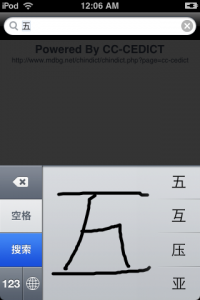Today a colleague showed me that what I had hoped for has come true: There is a full-featured, free, Creative Commons licensed dictionary, and there is a good iPhone application to use with it. The dictionary is CC-CEDICT, and the iPhone app DianHua.

So far (for the last couple of hours) it’s served me well. But I’m quite excited that the dictionary is seemingly relatively good and is also released under a Creative Commons license. That means it’s fair game for developers to use in applications we can’t yet imagine.
The project of building this dictionary, CC-CEDICT, is community-based using the wiki form. It’s wiki has a to-do list, which presently portends the addition of alcohol-related terms and XML terminology.
As with any wiki project, the content is only as good as the contributors. I’ll quote myself paraphrasing my future professor Cass Sunstein’s retelling of the Condorcet Jury Theorem:
The Condorcet Jury Theorem … states in part that in a jury, the probability that the right decision will be reached increases with the size of the jury, but only if the average juror is more likely than not to come up with the right decision on his or her own. If members of a jury are individually less than 50 percent likely get the right answer, then their deliberation magnifies the problem. Groups like these are wrong, Sunstein says, because of prejudices (freedom fries, anyone?), confusion, and incompetence.
But we can do more than hope incompetence, confusion, and prejudice don’t take over this dictionary, and that sufficient community editing keeps madness out of the reasonably robust foundation. We can contribute and edit ourselves! Also, of course, a smart reader of community-generated content knows what to doubt. And with dictionaries, it’s even worth doubting “authoritative” volumes with names like Oxford, Xinhua, and yes, even Webster.

Leave a Reply